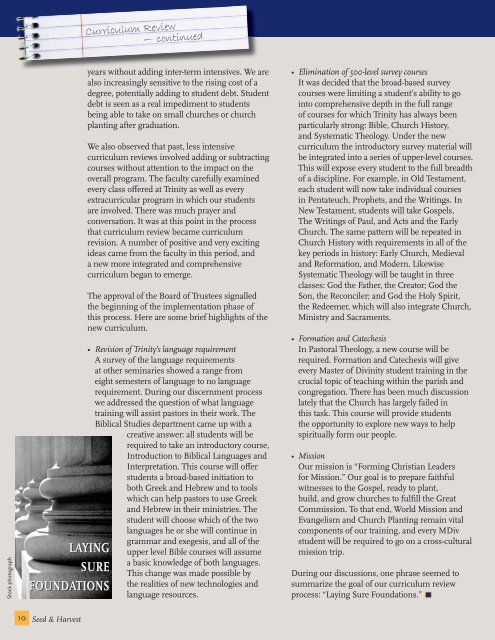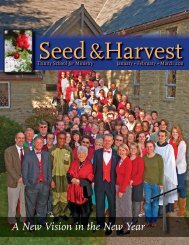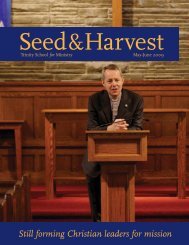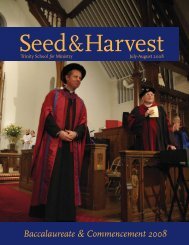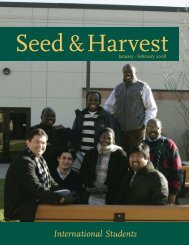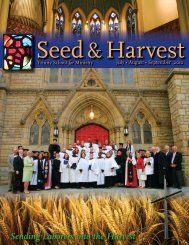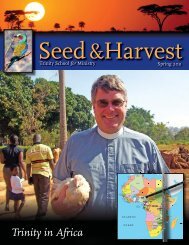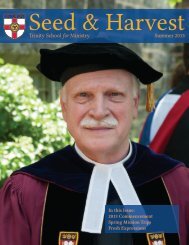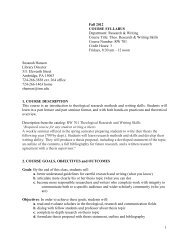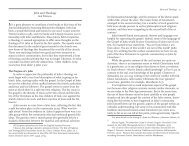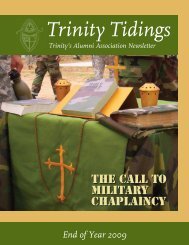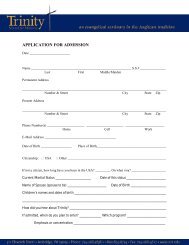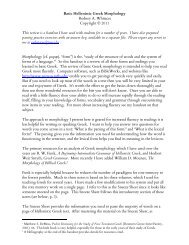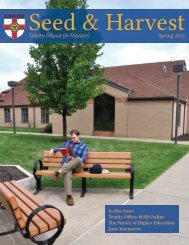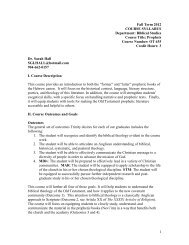S+H 2010 Apr-May-June.pdf - Trinity School for Ministry
S+H 2010 Apr-May-June.pdf - Trinity School for Ministry
S+H 2010 Apr-May-June.pdf - Trinity School for Ministry
You also want an ePaper? Increase the reach of your titles
YUMPU automatically turns print PDFs into web optimized ePapers that Google loves.
Curriculum Review<br />
— continued<br />
Stock photograph<br />
LAYING<br />
SURE<br />
FOUNDATIONS<br />
years without adding inter-term intensives. We are<br />
also increasingly sensitive to the rising cost of a<br />
degree, potentially adding to student debt. Student<br />
debt is seen as a real impediment to students<br />
being able to take on small churches or church<br />
planting after graduation.<br />
We also observed that past, less intensive<br />
curriculum reviews involved adding or subtracting<br />
courses without attention to the impact on the<br />
overall program. The faculty carefully examined<br />
every class offered at <strong>Trinity</strong> as well as every<br />
extracurricular program in which our students<br />
are involved. There was much prayer and<br />
conversation. It was at this point in the process<br />
that curriculum review became curriculum<br />
revision. A number of positive and very exciting<br />
ideas came from the faculty in this period, and<br />
a new more integrated and comprehensive<br />
curriculum began to emerge.<br />
The approval of the Board of Trustees signalled<br />
the beginning of the implementation phase of<br />
this process. Here are some brief highlights of the<br />
new curriculum.<br />
• Revision of <strong>Trinity</strong>’s language requirement<br />
A survey of the language requirements<br />
at other seminaries showed a range from<br />
eight semesters of language to no language<br />
requirement. During our discernment process<br />
we addressed the question of what language<br />
training will assist pastors in their work. The<br />
Biblical Studies department came up with a<br />
creative answer: all students will be<br />
required to take an introductory course,<br />
Introduction to Biblical Languages and<br />
Interpretation. This course will offer<br />
students a broad-based initiation to<br />
both Greek and Hebrew and to tools<br />
which can help pastors to use Greek<br />
and Hebrew in their ministries. The<br />
student will choose which of the two<br />
languages he or she will continue in<br />
grammar and exegesis, and all of the<br />
upper level Bible courses will assume<br />
a basic knowledge of both languages.<br />
This change was made possible by<br />
the realities of new technologies and<br />
language resources.<br />
• Elimination of 500-level survey courses<br />
It was decided that the broad-based survey<br />
courses were limiting a student’s ability to go<br />
into comprehensive depth in the full range<br />
of courses <strong>for</strong> which <strong>Trinity</strong> has always been<br />
particularly strong: Bible, Church History,<br />
and Systematic Theology. Under the new<br />
curriculum the introductory survey material will<br />
be integrated into a series of upper-level courses.<br />
This will expose every student to the full breadth<br />
of a discipline. For example, in Old Testament,<br />
each student will now take individual courses<br />
in Pentateuch, Prophets, and the Writings. In<br />
New Testament, students will take Gospels,<br />
The Writings of Paul, and Acts and the Early<br />
Church. The same pattern will be repeated in<br />
Church History with requirements in all of the<br />
key periods in history: Early Church, Medieval<br />
and Re<strong>for</strong>mation, and Modern. Likewise<br />
Systematic Theology will be taught in three<br />
classes: God the Father, the Creator; God the<br />
Son, the Reconciler; and God the Holy Spirit,<br />
the Redeemer, which will also integrate Church,<br />
<strong>Ministry</strong> and Sacraments.<br />
• Formation and Catechesis<br />
In Pastoral Theology, a new course will be<br />
required. Formation and Catechesis will give<br />
every Master of Divinity student training in the<br />
crucial topic of teaching within the parish and<br />
congregation. There has been much discussion<br />
lately that the Church has largely failed in<br />
this task. This course will provide students<br />
the opportunity to explore new ways to help<br />
spiritually <strong>for</strong>m our people.<br />
• Mission<br />
Our mission is “Forming Christian Leaders<br />
<strong>for</strong> Mission.” Our goal is to prepare faithful<br />
witnesses to the Gospel, ready to plant,<br />
build, and grow churches to fulfill the Great<br />
Commission. To that end, World Mission and<br />
Evangelism and Church Planting remain vital<br />
components of our training, and every MDiv<br />
student will be required to go on a cross-cultural<br />
mission trip.<br />
During our discussions, one phrase seemed to<br />
summarize the goal of our curriculum review<br />
process: “Laying Sure Foundations.”<br />
10 Seed & Harvest


